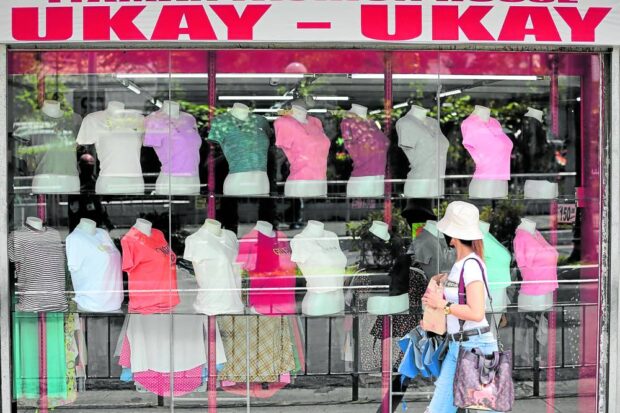Buying used items helps reduce carbon footprint, says e-shopping firm

‘PRELOVED’ | A shopper walks past a used-clothes, or “ukay-ukay” store in Cubao, Quezon City, in this photo taken on Aug. 17, 2022. The e-commerce platform Carousell cites the environmental benefits of preferring secondhand goods, mainly in terms of carbon emissions that are “avoided” in the concerned industries. (File photo by GRIG C. MONTEGRANDE / Philippine Daily Inquirer)
MANILA, Philippines — Buying preloved goods is turning out to be easy on the pocket and good for the environment, too.
According to the first “Circular Economy Impact” report by secondhand marketplace platform Carousell Group, 116,577 tons of carbon emissions were avoided in 2022 by consumers in Singapore, Hong Kong, Indonesia, Malaysia, the Philippines and Taiwan who patronized used goods instead of purchasing new items.
These secondhand items were spread across four categories: fashion and luxury, electronics, furniture and home living, and hobbies and toys. Popular items range from well-used cell phones to laptops, down to clothes, bags, and furniture.
The Singapore-based Carousell Group said the volume of avoided emissions was equivalent to the carbon footprint of a person taking a flight 1.4 million times from Manila to Davao.
The report also noted that 56 percent of purchases on the Carousell marketplace displaced the purchase of a new item, while the rest were purchases made on top of a brand-new product.
READ: PMFTC tapping electronic vehicles to reduce carbon footprint
READ: Baguio execs vow zero carbon emissions by 2050
Circular economy
“By facilitating secondhand transactions, (the) Carousell Group holds a central role in advancing the circular economy alongside our users in the greater Southeast Asia region,” said Carousell Group chief strategy officer Gaurav Bhasin.
“As a key enabler of the circular economy in our region, we have a responsibility to lead by example and measure the potential positive impact of choosing secondhand products over new ones in a trustworthy and transparent way,” he added.
The report, which was based on a survey conducted from July to August, also underscored the significant contribution of every transaction in lightening the impact of the retail industry on the environment.
It said that, for instance, buying a secondhand sofa on Carousell can on average, save up to 131 kilogram of CO2e (carbon dioxide equivalent), the equivalent of almost six trees absorbing carbon dioxide per year.
Buying a $780 well-used iPhone 14 (which sells at up to $1,499 for the top brand-new model) in the platform, meanwhile, is equivalent to saving 36 kg of Co2e, or two trees absorbing these emissions per year,, while a purchase of a $388 secondhand Macbook Pro yields saves 137 kg of Co2e, or six trees doing the same.
Quantified impact
Buying a $40 lightly used women’s coat in the platform is the same as saving 12 kg of Co2e, or one tree absorbing greenhouse gases.
The Carousell Group partnered with European climate tech company Vaayu to quantify the environmental impact of their platform by using artificial intelligence (AI) and machine learning technology.
Given the initial phase of its quantification journey, the Carousell Group said their report only covered four categories of goods, suggesting that the benefit of such secondhand marketplaces to the environment could be larger.
For her part, Vaayu co-founder and chief executive officer Namrata Sandhu said that the retail industry is responsible for 25 percent of the global carbon emissions, stressing the importance of cutting down its contribution to the accumulation of these greenhouse gases that cause global warming.
“Circular business models, like recommerce, offer a clear path to reducing retail’s impact on our planet, which is why we are so proud to partner with Carousell Group to quantify its climate impact and empower communications with their users,” Sandhu said.
Growing demand
The Carousell Group’s report also showed that 55 percent of the 13,998 surveyed users reported an increase in buying and selling of secondhand items in 2022 as compared to the previous year.
This highlights the growing demand in these countries for preloved goods, a trend that can help alleviate the environmental impact of the mega-industry.
The Carousell Group said its goal was to further accelerate the future of the secondhand market, supported by the rollout this year of a variety of programs and features across their platforms.
“Our mission is to make secondhand the first choice for everyone. We have stayed true to this mission over the past 11 years, and we remain committed to making selling and buying secondhand even simpler, more trusted, and convenient,” said Carousell Group co-founder and chief executive officer Quek Siu Rui.